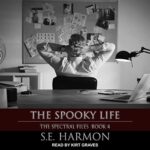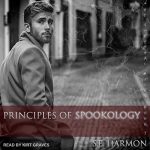Narrated by Kai Rubio
I liked the sound of the storyline of Chrysalis, book one in The Formicary duo, so as I’ve enjoyed books by S.E. Harmon in the past and even though the narrator is new-to-me, I decided to give the audiobook version a go. Please be aware that Chrysalis ends inconclusively and that the story continues in the second book, Cross, which I believe will be released in audio in late August. (It’s available in print already.)
So, that premise. A man wakes in a hospital bed after almost dying from a gunshot wound to the head, and has absolutely no idea who he is, or who wants him dead. The one thing he can remember is the name of his boyfriend – Grayson Laurie, a doctor at the hospital. When Gray finally comes to see him, he tells the man that his name Christian Cross – but that doesn’t ring any bells or bring anything back. Gray continues to visit him, but Christian is confused by the coolness and distance between them, and he’s stunned when Gray finally, and not without some bitterness, tells him they broke up over four years earlier. Christian barely has time to grasp that when Gray also tells him that Chris is the one who left, and although he never said why, it’s clear Gray believes it’s because Chris was cheating and wanted to be with someone else. After this bombshell, Chris doesn’t expect to see Gray again, which is a bummer as, right now, he’s the only link Chris has with his past – but Gray does return, although it soon becomes clear that he has about as much idea of what Chris has been doing with his life as Chris himself does. Which is, obviously, not a lot. When a man Chris doesn’t recognise enters his hospital room and tells him they’re together – implying he’s the reason Chris left Gray – Chris is even more convinced that something is wrong and decides enough is enough. He’s been in the hospital two weeks and is no closer to finding out anything about what he’s been doing or why someone would try to kill him – it’s time to get out of there and start looking for answers.
The author does a great job with the set up, carefully dropping little hints here and there that indicate there’s more to Chris than meets the eye – one of the doctors points out his lack of fingerprints and that he has certain surgical enhancements (his Achilles tendons have been replaced, for example) – and a picture slowly starts to build up of who and what he might be. But once Christian leaves the hospital (sneaking out rather than just checking himself out) – with no problem whatsoever – and is then very conveniently picked up off the street by Gray just a few pages later, all that intrigue and tension just dissipate, and we get chapters and chapters of Christian and Gray (because, of course, Gray takes Christian to stay with him) settling into a cosy domesticity, complete with cooking disasters and shopping sprees (when Chris, who is supposed to be hiding from the police, moves about freely in public with no attempt to disguise himself). Now, I like a good second chance romance, and actually all those cutesy moments of connection and togetherness are really good – but they’re in the wrong book (or in the wrong place) because after the excellent set-up, I wanted to be alongside Christian as he searches for the truth about himself, finds clues and starts piecing them all together.
And the problems don’t end there, unfortunately. The suspense plot is more full of holes than a pack of the finest Swiss cheese, so much so, that there are way too many to point out. The things that bothered me most – in addition to those I’ve already mentioned:
- Christian stays with Gray even though he knows it will put him in danger, and so does Gray but he doesn’t seem to worry about it at all
- Christian is able to operate a biometric device using his fingerprints – when he doesn’t have any
- All the head/brain scans that were presumably done on a patient with head trauma somehow missed a tracking implant in the neck and the modifications to the eyes
- Christian built a hidden room in Gray’s house without Gray knowing anything about it
- Said room contains a shit-ton of money – but later, Christian has to risk going to an ATM to get cash
I realise a degree of suspension of disbelief is required with a story like this, but there comes a point where I start to wonder if it’s a case of poor editing and continuity rather than my needing to stretch my credulity a bit more.
The chemistry between Chris and Gray is okay although I didn’t feel much heat between them, and to be honest, Gray is a bit bland. But I did like their dynamic and it’s clear they care deeply for each other, despite the fact that Gray is trying hard not to fall for Chris again. The best part of the book is Chris, really, and I liked his dawning awareness of the difference between the Chris he is now and the one he used to be and whose decisions present-Chris is now questioning.
The biggest problem with this one overall, however, is the narration. I’m sure that had someone of the calibre of Greg Boudreaux been at the microphone, all those plot holes would have been far less obtrusive, the story would have sounded tense and exciting and the characters would have had actual personalities. Kai Rubio appears to be fairly new to audiobook narration – he’s certainly new to me and at time of writing has nine titles available at Audible – but I’m afraid he isn’t the right narrator for this book. His voice is pleasant enough, but although he reads with a degree of expression, there’s nothing behind it; it’s a reading rather than a performance, and his habit of leaving very long pauses at the end of every clause and every sentence drove me nuts. His pacing when he speaks is fine – it’s the large gaps that are the problem. His character differentiation is okay, although I suspect he’d run into problems in a book with a larger cast, because he doesn’t seem to have much range in terms of pitch, tone and timbre. Worst of all, the wit and humour I usually expect to find in an S.E. Harmon book are completely absent; it’s present in the text (I read some of it when I was checking some details in order to write this review, and Chris has a wonderfully snarky voice and makes some very funny observations) but none of that is present in the audio.
Chrysalis should really have worked for me despite its inconsistencies – it’s the sort of story I usually love – but the narration killed it pretty much out of the gate and I can’t recommend it. I may pick up the second book to see how everything turns out, but if I do, I’ll read rather than listen.
Caz
Buy Chrysalis by S.E. Harmon on Amazon





What a shame! When I read your first couple of paragraphs I was thinking how cool this set up was and how much I’d enjoy reading that book. It’s unfortunate that that wasn’t the book that was actually written. The plot holes would really bother me.
I just finished the only S.E. Harmon book I’ve ever read, The Blueprint, on audio. I have to admit I felt the characterization was inconsistent. Either that or she wanted her characters to act like yo-yos, I mean, people often do act inconsistently. The story wasn’t bad, but it left me unsatisfied, and the denial and gaslighting got old. What made it worth listening to was the incredible narration by Alexander Cendese and Sean Crisden.
I read your review of Coddiwomple, and I might give it a try (I wish Cendese and/or Crisden were narrating it), but are there any other books by this author you’ve enjoyed.
That’s kind of how I felt when listening! It was such a great set-up, but then it started going all over the place. I do think a better narrator would have helped – as I said someone like Greg would have made it all sound exciting, even though he couldn’t have fixed the worst plot holes. I was also suspicious of the author’s disclaimer in book 2 – which is widely quoted in reviews – that “if you can’t deal with plot holes, this is probably not the book for you” (my paraphrasing). To me, that says, “I wrote myself into a corner and couldn’t figure another way out of it” – sure, it’s adventure and sci-fi and we’ve got assassins and Avengers-type super-soldiers – but whatever you do still has to make sense in whatever world you’ve created. Having someone without fingerprints operate a fingerprint-biometric device, or using an ATM when he’s got loads of money are straightforward continuity issues, which makes them fair game for criticism IMO. The books are in KU though, so I might give book 2 a go in print.
I’ve reviewed all the books in the author’s Spectral Files series here; they’ve been getting better with each book and I’m planning to review book 4 when it comes out in audio (it’s out in print already).
Coddiwomple was an odd experience because I usually like Nick Hudson, but he just didn’t work for me in that one. Again, I suspect that the narration made a big difference to my overall opinion of the story.
What you say makes a lot of sense. Smoothing over plot holes via dues ex machina (or even a “wink, wink, nod, nod”) is one thing, and in a sci-fi I can often overlook it. Having straight up continuity issues is sloppy and makes me less flexible for the other plot manipulations I might usually forgive. In The Blueprint, Harmon doesn’t address the unhealthy way Kelly and Blue communicate (or don’t) at times and that’s a big red flag for me. Blue’s gaslighting was never addressed.
I’ll take a look at your reviews of The Spectral Files. Thanks!
Too bad! I was just considering this book last week, wondering if it was good, so this is excellent timing. Suspension of disbelief is meant to disconnect a story from real life, not excuse faulty logic within the bounds of the story. Plot holes are a very legitimate complaint; they’re a result of poor/lazy writing, in my opinion.
Have you read the Death and the Devil series by L.J. Hayward? This description reminds me of it, a bit, with the secret agent vibe, though DaeD is much better apparently.
Your comments about the narrator not getting the humor are interesting. I’m on book 2 of the Spectral Files in audio and really enjoying them. I read the first book and wasn’t impressed. It wasn’t until I listened to it that I “got” the main character because the narrator interpreted his snarkiness so well. When I read it, he came across as kind of whiny. It’s amazing what a good narrator can do.
Exactly – I love action movies and sci-fi movies and suspension of disbelief is essential, but as you say, faulty logic isn’t the same thing.
The Death and the Devil series is awesome; only the first book is in audio unfortunately (review HERE) but it’s superbly plotted and well worth listening to. It does contain some sci-fi elements, but the plot doesn’t rely on them, and the two leads are brilliantly characterised. If you haven’t read or listened to it yet, then do – if Chrysalis sounds like the sort of thing you would enjoy, then When Death Meets the Devil is something you won’t want to miss. This one pales by comparison.
Sadly, I’ve listened to any number of books where the narrator just doesn’t get it. We all know a good narrator can make a book just as a poor one can break it, and while all the plot holes and inconsistencies would still have been there, a better narrator with the ability to tune into the humour and other emotions would have greatly improved this one.